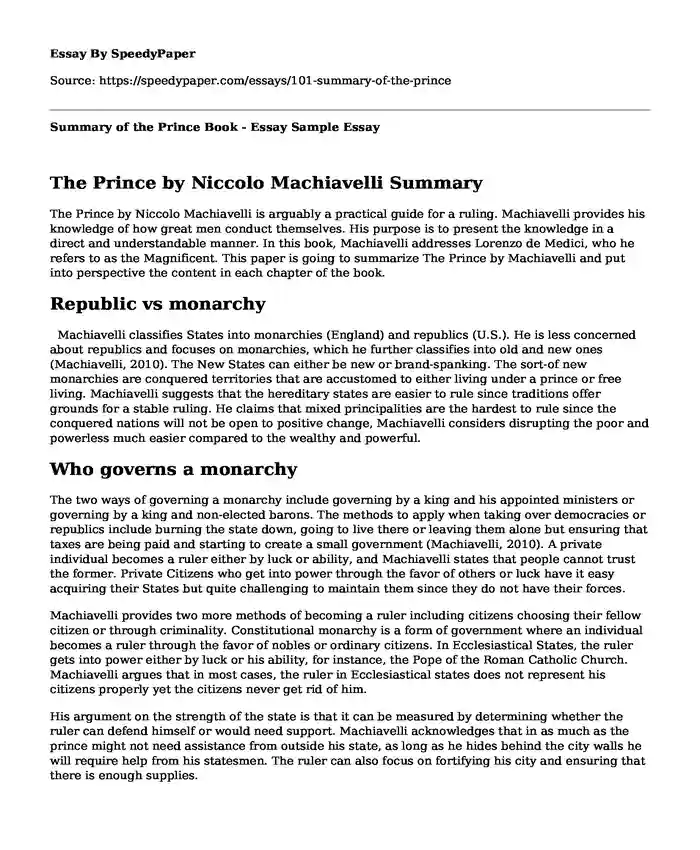
| Type of paper: | Essay |
| Categories: | Politics Literature Government |
| Pages: | 3 |
| Wordcount: | 794 words |
The Prince by Niccolo Machiavelli Summary
The Prince by Niccolo Machiavelli is arguably a practical guide for a ruling. Machiavelli provides his knowledge of how great men conduct themselves. His purpose is to present the knowledge in a direct and understandable manner. In this book, Machiavelli addresses Lorenzo de Medici, who he refers to as the Magnificent. This paper is going to summarize The Prince by Machiavelli and put into perspective the content in each chapter of the book.
Republic vs monarchy
Machiavelli classifies States into monarchies (England) and republics (U.S.). He is less concerned about republics and focuses on monarchies, which he further classifies into old and new ones (Machiavelli, 2010). The New States can either be new or brand-spanking. The sort-of new monarchies are conquered territories that are accustomed to either living under a prince or free living. Machiavelli suggests that the hereditary states are easier to rule since traditions offer grounds for a stable ruling. He claims that mixed principalities are the hardest to rule since the conquered nations will not be open to positive change, Machiavelli considers disrupting the poor and powerless much easier compared to the wealthy and powerful.
Who governs a monarchy
The two ways of governing a monarchy include governing by a king and his appointed ministers or governing by a king and non-elected barons. The methods to apply when taking over democracies or republics include burning the state down, going to live there or leaving them alone but ensuring that taxes are being paid and starting to create a small government (Machiavelli, 2010). A private individual becomes a ruler either by luck or ability, and Machiavelli states that people cannot trust the former. Private Citizens who get into power through the favor of others or luck have it easy acquiring their States but quite challenging to maintain them since they do not have their forces.
Machiavelli provides two more methods of becoming a ruler including citizens choosing their fellow citizen or through criminality. Constitutional monarchy is a form of government where an individual becomes a ruler through the favor of nobles or ordinary citizens. In Ecclesiastical States, the ruler gets into power either by luck or his ability, for instance, the Pope of the Roman Catholic Church. Machiavelli argues that in most cases, the ruler in Ecclesiastical states does not represent his citizens properly yet the citizens never get rid of him.
His argument on the strength of the state is that it can be measured by determining whether the ruler can defend himself or would need support. Machiavelli acknowledges that in as much as the prince might not need assistance from outside his state, as long as he hides behind the city walls he will require help from his statesmen. The ruler can also focus on fortifying his city and ensuring that there is enough supplies.
Types of Army
The four armies that each state should have include auxiliaries, mercenaries, local army and a mixture of the three (Machiavelli, 2010). Auxiliaries and mercenaries are a waste of time and money since they are unreliable and dangerous. It is safe and more reliable for the prince to have his local army. Machiavelli’s argument on why rulers are praised or blamed is that a ruler should only be good if it makes political sense to him. However, he warns that the prince should avoid all the negative behaviors that would threaten his power. On cruelty and compassion, Machiavelli suggests that people respond better to cruelty than mercy, for instance, in the case of Cesare Borgia, peace was restored by applying cruelty.
Machiavelli suggests that a ruler can keep his promises by either law or force (Machiavelli, 2010). He suggests that a good ruler must be virtuous yet willing to act contrary if the situation calls for it. A ruler should not present himself in a manner that calls for hate and contempt. A wise ruler should never disarm his subjects because they might hate him. Building fortresses when a ruler is more scared of his people than foreigners is also ridiculous. Machiavelli suggests that for a prince to be respected, he has to participate main wars and win them.
Machiavelli is very particular regarding the importance of selecting good ministers because they reflect the kind of a ruler that a state has. He opines that an ideal minister focuses on his master’s interests. However, the ruler should also be rewarding and respectful of his ministers’ welfare. The leader should be open to advice but only when he seeks it out. Machiavelli finalizes the book by taking about disunity in Italy and is positive that Lorenzo the Magnificent will reinstate Italy’s pride and honor.
References
Machiavelli, N. (2010). The prince. Chicago, IL: University of Chicago Press.
Cite this page
Summary of the Prince Book - Essay Sample. (2018, Feb 09). Retrieved from https://speedypaper.com/essays/101-summary-of-the-prince
Request Removal
If you are the original author of this essay and no longer wish to have it published on the SpeedyPaper website, please click below to request its removal:
- Religion Essay Example: Letter from Luther to Anyone During The Reformation
- The General Theory of Employment, Interest and Money - Book Review Essay Sample
- Essay Sample on Ottoman, Safavid and Mughal Empires
- Free Essay: Withdrawal from the IRA in US
- Analysis of Ethical Problems of the Norvatis Pharmaceutical Company Paper Example
- Free Essay on Eyewitness History: Alexander the Great
- Essay Sample on Western University Of Graduate Nursing
Popular categories




